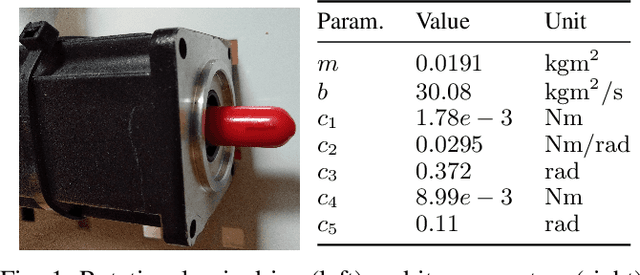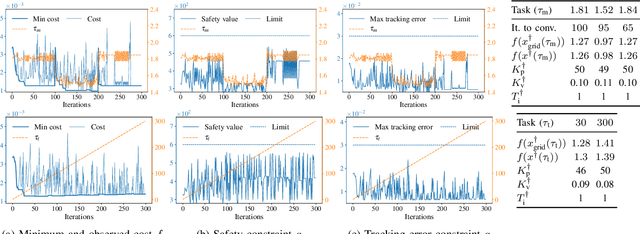Christopher König
Adaptive Bayesian Optimization for High-Precision Motion Systems
Apr 22, 2024Abstract:Controller tuning and parameter optimization are crucial in system design to improve closed-loop system performance. Bayesian optimization has been established as an efficient model-free controller tuning and adaptation method. However, Bayesian optimization methods are computationally expensive and therefore difficult to use in real-time critical scenarios. In this work, we propose a real-time purely data-driven, model-free approach for adaptive control, by online tuning low-level controller parameters. We base our algorithm on GoOSE, an algorithm for safe and sample-efficient Bayesian optimization, for handling performance and stability criteria. We introduce multiple computational and algorithmic modifications for computational efficiency and parallelization of optimization steps. We further evaluate the algorithm's performance on a real precision-motion system utilized in semiconductor industry applications by modifying the payload and reference stepsize and comparing it to an interpolated constrained optimization-based baseline approach.
Safe and Efficient Model-free Adaptive Control via Bayesian Optimization
Jan 19, 2021



Abstract:Adaptive control approaches yield high-performance controllers when a precise system model or suitable parametrizations of the controller are available. Existing data-driven approaches for adaptive control mostly augment standard model-based methods with additional information about uncertainties in the dynamics or about disturbances. In this work, we propose a purely data-driven, model-free approach for adaptive control. Tuning low-level controllers based solely on system data raises concerns on the underlying algorithm safety and computational performance. Thus, our approach builds on GoOSE, an algorithm for safe and sample-efficient Bayesian optimization. We introduce several computational and algorithmic modifications in GoOSE that enable its practical use on a rotational motion system. We numerically demonstrate for several types of disturbances that our approach is sample efficient, outperforms constrained Bayesian optimization in terms of safety, and achieves the performance optima computed by grid evaluation. We further demonstrate the proposed adaptive control approach experimentally on a rotational motion system.
 Add to Chrome
Add to Chrome Add to Firefox
Add to Firefox Add to Edge
Add to Edge